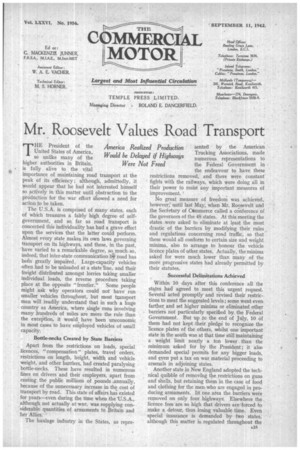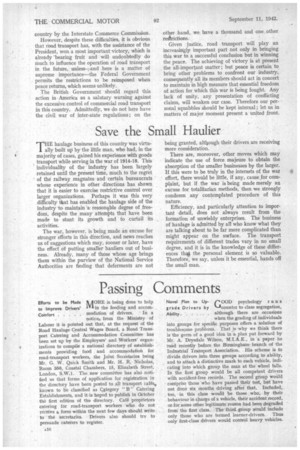Mr. Roosevelt Values Road Transport
Page 17

Page 18

If you've noticed an error in this article please click here to report it so we can fix it.
THE President of the United States of America, so unlike many of the higher authorities in Britain, is fully alive to the vital importance of maintaining road transport at the peak of its efficiency ; although, admittedly, it would appear that he had not interested himself so actively in this matter until obstruction to the production for the war effort showed a need for action to be taken.
The U.S.A. is comprised of many states, each of which treasures a fairly high degree, of selfgovernment, and so far as road transport is concerned this individuality has had a grave effect upon the services that the latter could perform. Almost every state makes its own laws governing transport on its highways, and these, in the past, 'have varied to a remarkable degree, so. much. so, indeed, that inter-state communication bi road has bean greatly impaired. Large-capacity vehicles • often had to be unloaded at a state tile, and their freight distributed amongst lorries taking smaller individual loads, the reverse procedure taking place at theopposite "frontier." Some people might ask why operators could not have run smaller vehicles throughout, but most tzansport men will readily understand that in such a huge country as America, where _single runs involving many hundreds of miles are more the rule than the exception, it would have been uneconomic in most cases to have employed vehicles of small capacity.
Bottle-necks Created by State Barriers Apart from the restrictions on loads, special licences, "compensation" plates, travel orders, restrictions on length, height, width and vehicle weight, and other barriers, had created paralysing bottle-necks. These have resulted in numerous fines on drivers and their employes, apart from costing the public millions of pounds .annually, because of the unnecessary increase in the cost of transport by road. This state of affairs has existed for years—even during the time when the 'U.S.A., although not actually at war, was supplying considerable quantities of armaments to Britain and her Allies.
The haulage industry in the States, as repre sented by the American Trucking Associations, made numerous representations to the Federal Government in the endeavour to have these restrictions removed, and there were constant fights with the railways, which were doing all in their power to resist any important measures of improvement.'
No great measure of freedom was achieved, however; until last May, when Mr. Roosevelt and .the Secfetary of Commerce called a conference of the governors of the 48 states. At this meeting the states were asked to eliminate at least the most drastic of the barriers by modifying their rules and regulations concerning road traffic, so that these would all conform to certain size and weight minima, also to arrange to honour the vehicle licence plates of other states. Actually, the minima asked for were much lower than many of the more progressive states had already permitted by their statutes.
Successful Delimitations Achieved Within 10 days after this conference all the states had agreed to meet this urgent request. Several acted promptly and revised their restrictions to meet the suggested levels; some went even farther and set higher minima or eliminated other barriers not particularly specified by. the Federal Government. But up to the end of July, 10 of them had not kept .their pledge to recognize the licence plates of the others, whilst one important state in the south was at that time still maintaining a weight limit nearly a ton lower than the minimum asked for by the President ; it also demanded special permits for any bigger loads, and even put a tax on war material proceeding to arsenals in adjoining states.
Another state in New England adopted the technical quibble of removing the restrictions on guns and shells, but retaining them in the case of food and clothing for the men. who are engaged in producing armaments. Iii one area the barriers were removed on only four highways-. Elsewhere the licence fees are so high that drivers are -forced to make a detour, thus losing valuable time. Even special insurance is demanded by two states, although this matter is regulated throughout the country by the Interstate Commerce Commission.
However, despite these difficulties, it is obvious that road transport has, with the assistance of the President, won a most important victory, which is already -bearing fruit and will undoubtedly do much to influence the operation of road transport in the future, unless--and here is a matter of supreme importance—the Federal Government permits the restrictions to be reimposed when peace returns, which seems unlikely.
The British Government should regard this action in America as a salutary warning against the excessive control of commercial road transport in this country. Admittedly, we do not here have the civil war of inter-state regulations ; on the other hand, we have a thousand and one other resirictions.
Given justice, road transport will play an increasingly important part not only in bringing this war to a successful conclusion but in winning the peace. The achieving of victory is at present the all-important matter ; but peace is certain to bring other problems to confront our industry, consequently all its members should act in concert to maintain in high measure that essential freedom of action for which this war is being fought. Any lack of unity, any presentation of conflicting claims, will weaken our case. Therefore our personal squabbles should be kept internal ; let us in matters of major moment present a united front.




















































